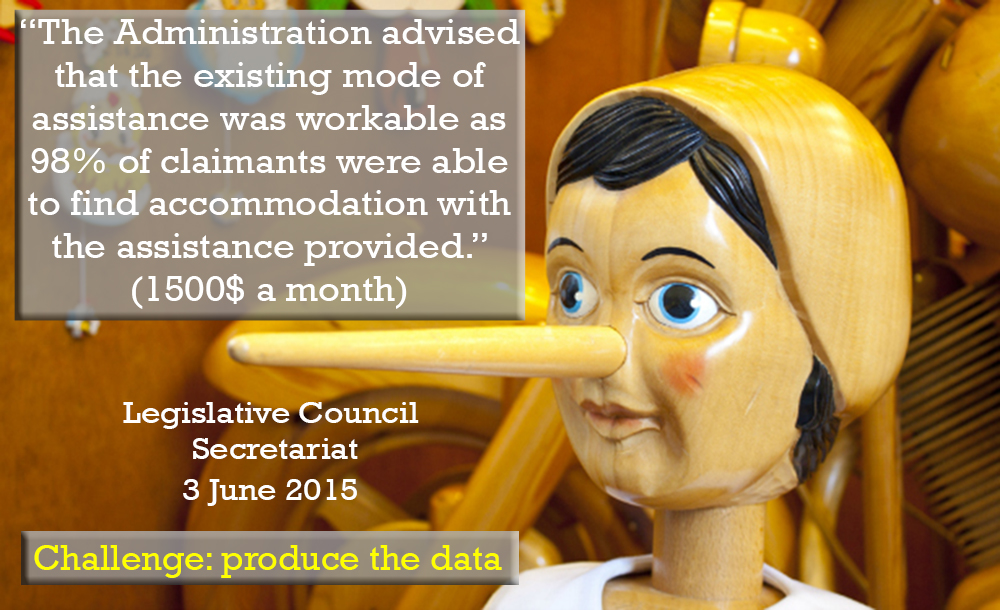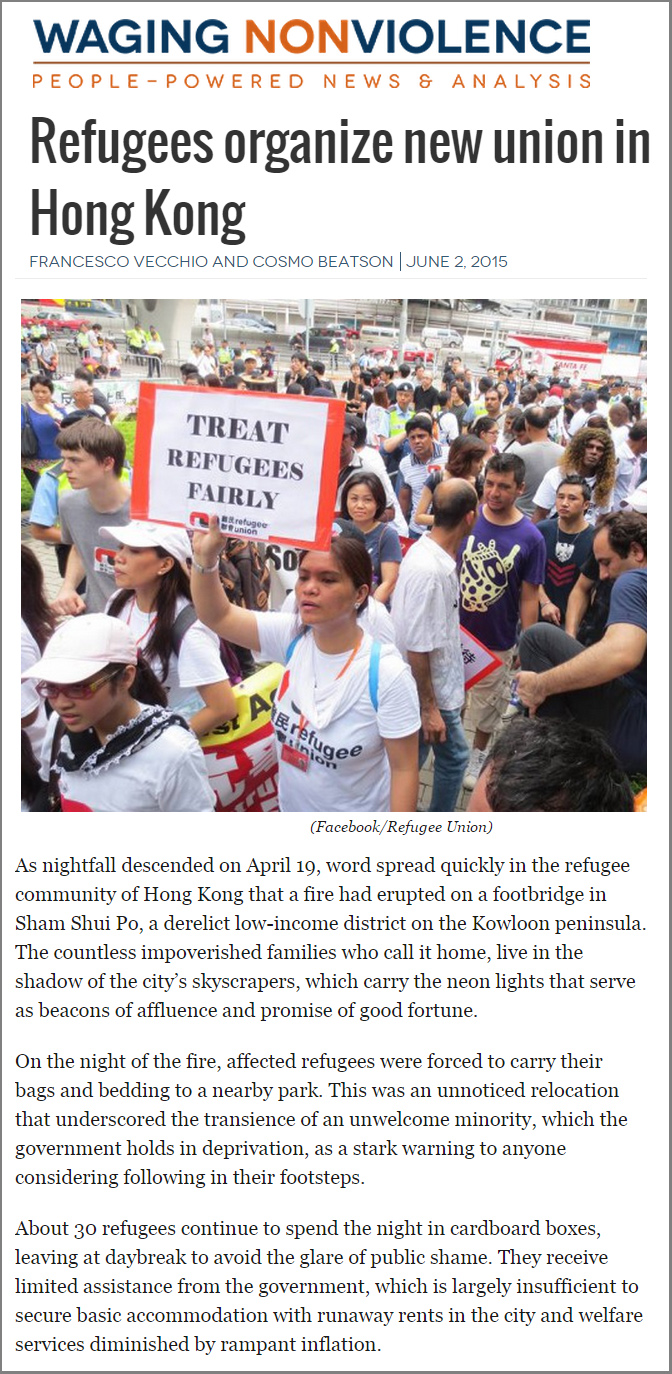Government rent statistics disproved by Vision First data
Jun 5th, 2015 | Government, Housing, VF Opinion, Welfare | Comment
Vision First keeps records of rental amounts in Tenancy Agreements signed by refugees, as well as the rent assistance received to them by ISS-HK. Our data is collected at time of registration and generally updated during subsequent case work.
On 3 June 2015, the Legislative Council Secretariat submitted to the Panel on Welfare Services that, “The Administration advised that the existing mode of assistance was workable as 98% of claimants were able to find accommodation with the assistance provided.” In other words, the authorities imply that 98% of refugees secure accommodation with the assistance provided, that is seemingly inadequate for just 2%.
Technically the statement is correct, although it appears to be largely misleading. If the rent assistance were $100 per month, the statement would still not be false, because it glosses over the problem of rent balances refugees are forced to pay monthly without the right to work legally.
Vision First calls on the authorities to produce the data. The SWD has copies of the Tenancy Agreements entered between 8600 refugees (including children) and their respective landlords. Those are real rents paid in the open market, irrespective of the legality of dangerous slums and subdivided flats. The actual rent assistance received by each refugee is also known.
As way of example, we compiled a simple datase of the latest 100 Vision First registrations, out of a database of more than 2000 refugees. There are three data columns: “REAL RENT” paid by refugees to landlords; “ISS PAYS” to refugees in rent assistance; “NOTES” on individual housing arrangement. Without claiming to be representative of the wider situation, the table makes for interesting reading:
- Most of the refugees who pay $1500 rent, in line with the government allowance, live in slums, or illegal structures that are increasingly deemed unacceptable by case workers at contract expiry. When all the slums are closed down, where will refugee tenants relocate to?;
- Cohabitation is widespread with the growing risk of defaulting on leases when friends fail to get along, move out, are removed or deported, or voluntarily leave the city. It should be noted that security deposits are only paid once in the lifetime of a refugee in HK. How much money will HKSAR lose in security deposits through this policy?;
- Most refugees are faced with rent balances that must be met personally. The options are: a) assistance from NGO or churches; b) remittances from overseas; c) donation from well-wishers; d) assistance from working girlfriends; e) WORKING ILLEGALLY. Our readers may guess which arrangement is most prevalent;
- The data presented raises the following question: If ‘the existing mode of assistance is workable’, who is it workable for?
Sample dataset from recent Vision First registrations
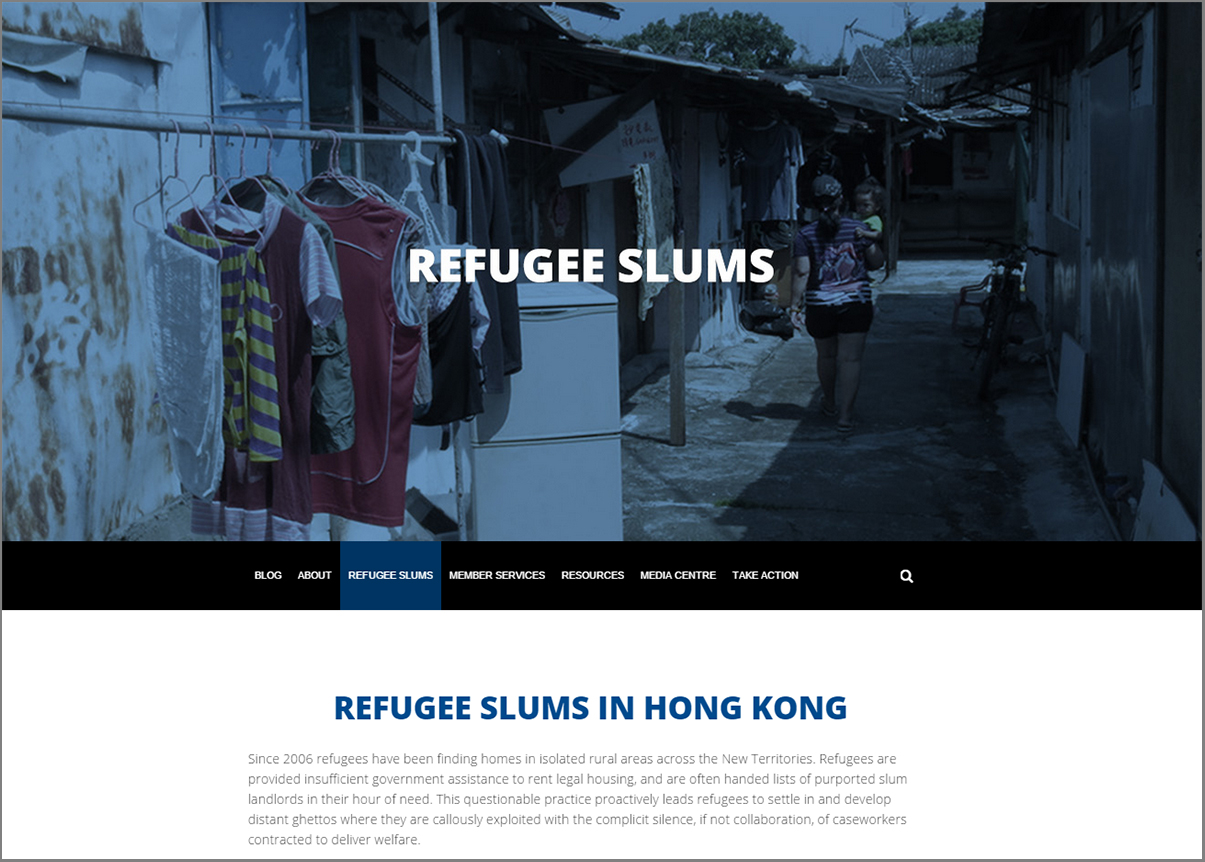
Refugees organize new union in Hong Kong
Jun 3rd, 2015 | Media, Refugee Community, VF Opinion | Comment
LegCo Welfare Panel to discuss refugee aid on 8 June 2015
May 30th, 2015 | Food, Government, Housing, VF Opinion, Welfare | Comment
On 1 April 2015, Vision First and the Refugee Union launched an action to file complaint letters with the Legislative Council Redress System. Several hundred letters were completed and lodged with the assistance of lawmaker Fernando Cheung Chiu-hung and his hardworking team.
The complaints to the Legislative Council summarized the daily plight of refugees who rely entirely on government welfare and are not allowed to earn an honest living. Most often, refugees have no savings, certainly no lawful income and most commonly cannot rely on limited social networks and NGO assistance.
It is widely recognized that the current levels of assistance offered refugees are grossly inadequate: $1500 in rent assistance, $1200 in food coupons and a few hundred dollars for utilities and transportation. Refuges are loath to rely exclusively on welfare, but stringent immigration policies punish them for working and leave them with no alternative.
Vision First request that the Hong Kong Government, the Security Bureau and SWD fulfil their obligation to provide for asylum seekers and refugees’ basic financial, material needs or otherwise. These needs include, but are not limited to, appropriate quantity and quality of food assistance, payment of full rent and utilities, payment of full rental deposits to landlord, daily necessities like cooking gas, clothing, health care, transport allowance for required trips always payable in full and in advance. We request that ISS-HK sign the Tenancy Agreements as refugees have no savings or income to pay rent balances every month.
Vision First further request that a Task Force be established to investigate why persons requesting and having been granted international protection in Hong Kong have been left destitute despite a system being in place to disburse government funding to prevent this condition from happening. Such policy failures have caused refugees needless and unreasonable physical, mental and psychological suffering.
On 22 April 2015, Vision First and representatives of the Refugee Union met with the Hon. Fernando Cheung Chiu-hung to present these concerns to the Legislative Council’s Panel on Welfare. Vision First noted that deterrence objectives and criminalization of vulnerable foreigners should not overshadow welfare considerations when refugees are suffering in our community. It stands to reason that, if work rights are denied to refugees, the authorities have a legal and moral obligation to increase welfare to realistic levels consistent with human right laws.
Following the above initiative, we are pleased to inform that the Legislative Council’s “Panel on Welfare Services” has scheduled “Issues relating to welfare of refuges, torture claimants and asylum seekers” for their meeting on Monday, 8 June 2015. Refugees are invited to submit suggestions to Vision First early next week.
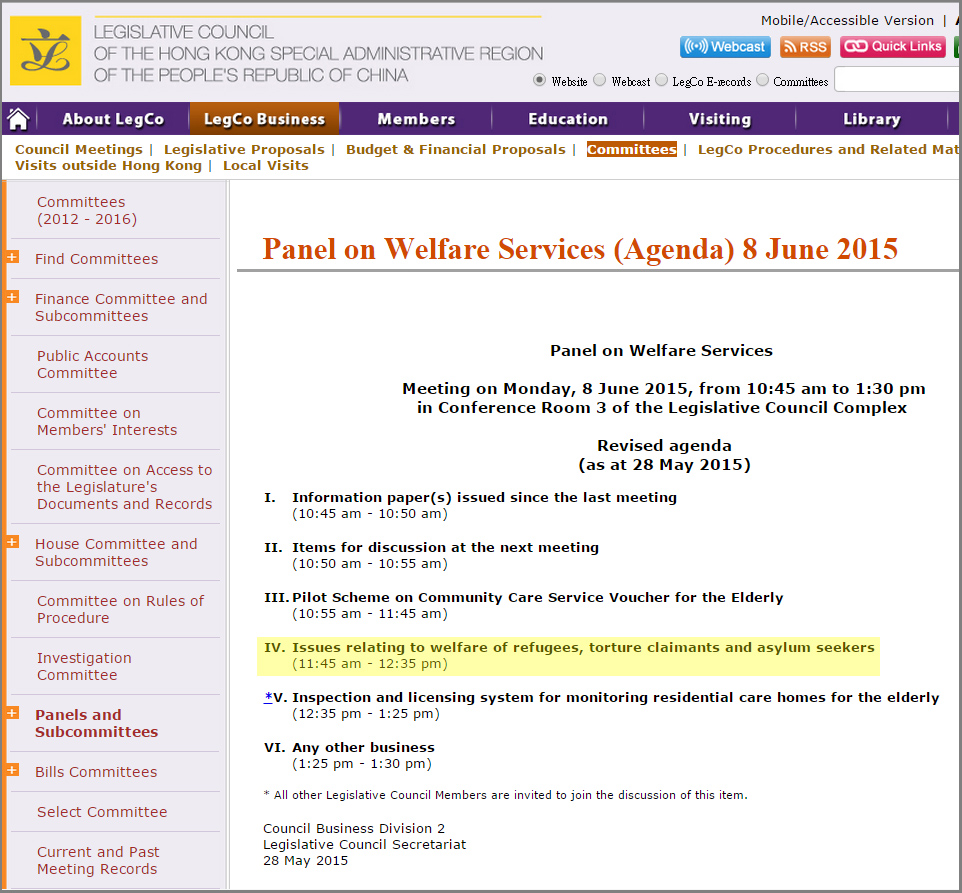
Legal team successfully counters Immigration’s hasty removal action
May 24th, 2015 | Immigration, Legal, Refugee Community, Rejection, VF Opinion | Comment
There wasn’t an empty seat in the courtroom as members of the Refugee Union attended the emergency proceedings to stop the hasty removal of a hapless South Asian refugee by the Director of Immigration. Flanked by two stern-looking Immigration officers in blue uniforms, a bewildered Mr. Q stooped apprehensively in a High Court defendant box. A dark oversize jacket draped the worries of a man who would have been deported three days earlier were it not for the timely intervention of a pro bono legal team.
It is likely that Mr. Q was profiled as undesirable by Immigration officers when he arrived at Hong Kong International Airport on 23 December 2014. He was refused permission to land and taken into custody. He subsequently lodged an asylum claim and was detained at CIC under Section 37ZK of the Immigration Ordinance that prescribing, “A claimant may be detained … pending final determination of the claimant’s torture claim.” The issue is: How long can a refugee be lawfully detained?
Trouble erupted in Mr. Q’s life after he participated in district elections in his country of origin and was assaulted and threatened that, “All your family will be wiped out if you don’t change political party.” As the 45 year-old family man was unwilling to fight back, the forsaken road of asylum beckoned and he fled to Hong Kong. On 9 March 2015 Immigration rejected his asylum claim at first instance and a troubled Mr. Q sought the assistance of the Refugee Union.
“He has a strong case and is afraid of being deported”, explains Arif of the Refugee Union, “He called me from CIC. He said that if he goes back [his country], his opponents will kill him. Immigration rejected his case and on 18 May arranged a plane ticket to remove him. He was very scared. It was a big emergency. I am very thankful to the lawyers who helped us immediately.”
Alerted by the Refugee Union, solicitor Chris Lucas and Barrister Robert Tibbo swung into action to counter manoeuvres by the Director of Immigration aimed ostensibly at expediting Mr. Q’s removal. Considerable weight should be given the fact that the lawyers had met the refugee during a pro bono legal visit to CIC on 6 May 2015, but nevertheless Immigration flagrantly ignored such legal representation to fast-track the rejection of Mr. Q’s appeal and his removal in a matter of days. Such rushed arrangements are sufficient to raise suspicion on this case.
An attentive audience followed the two-hour Habeas Corpus hearing that was opened by Barrister Tibbo’s statement: “The Director of Immigration fast-tracked the removal of my client. He has ridden rough-shod over the constitutional rights of a refugee who was warehoused in CIC, as if in an Australian off-shore processing centre. My client was detained for five months instead of being released five weeks after lodging a Non-Refoulement Claim as prescribed by law.” It was submitted that pursuant to the Ghulam Rbani Court of Final Appeal Judgement, Immigration failed in due diligence and gave rise to conduct that is now subject to a damage claim.
The legal grounds briefly state that the Director of Immigration, K.K. Chan cannot lawfully detain a claimant when it becomes clear that the determination process cannot be concluded within a reasonable time. The Ghulam Rbani judgment sets this at five weeks, not the five months of Mr. Q’s ongoing detention. Mr. Tibbo put to the court that the discretion to release a refugee must be exercised after five weeks, or the subsequent detention period becomes arbitrary and therefore unlawful.
Counsel raised a host of problems, including: looking at the Questionnaire it appears that Mr. Q did not receive proper legal representation inside CIC; he did not have access to resources and country of origin information; he attended an oral hearing without a lawyer; he did not have a lawyer for the appeal; the appeal rejection contained fundamental mistakes; the decision was not interpreted in his language; CIC officers prevented Mr. Q from faxing documents to his lawyers; and, a copy of Immigration’s Notice of Decision had not been provided to the legal team, despite formal request made to the Director of Immigration.
“Given the complexity of his claim,” Tibbo submitted, “My client should have been released at the five week mark. Instead he was discriminated. Many other claimants have been released. Why not him? He was treated differently from others released on recognizance, many of whom are in this courtroom. The Director of Immigration cannot detain arbitrarily and cannot do this without good reason. My client should not be removed from Hong Kong pending the exhaustion of his legal rights, including a judicial review of the rejection of his Non-Refoulement Claim and a damage claim for unlawful detention.”
The Honourable Judge Kent Yee presided fairly and extended the stay on the removal order until 29 May, indicating that he intended to give this matter further thought before issuing a written judgement on 26 May 2015. The defence team was encouraged by the extension that granted time to apply for Legal Aid and successfully resist Immigration’s attempts to hastily remove Mr. Q arguably in violation of his right to asylum.
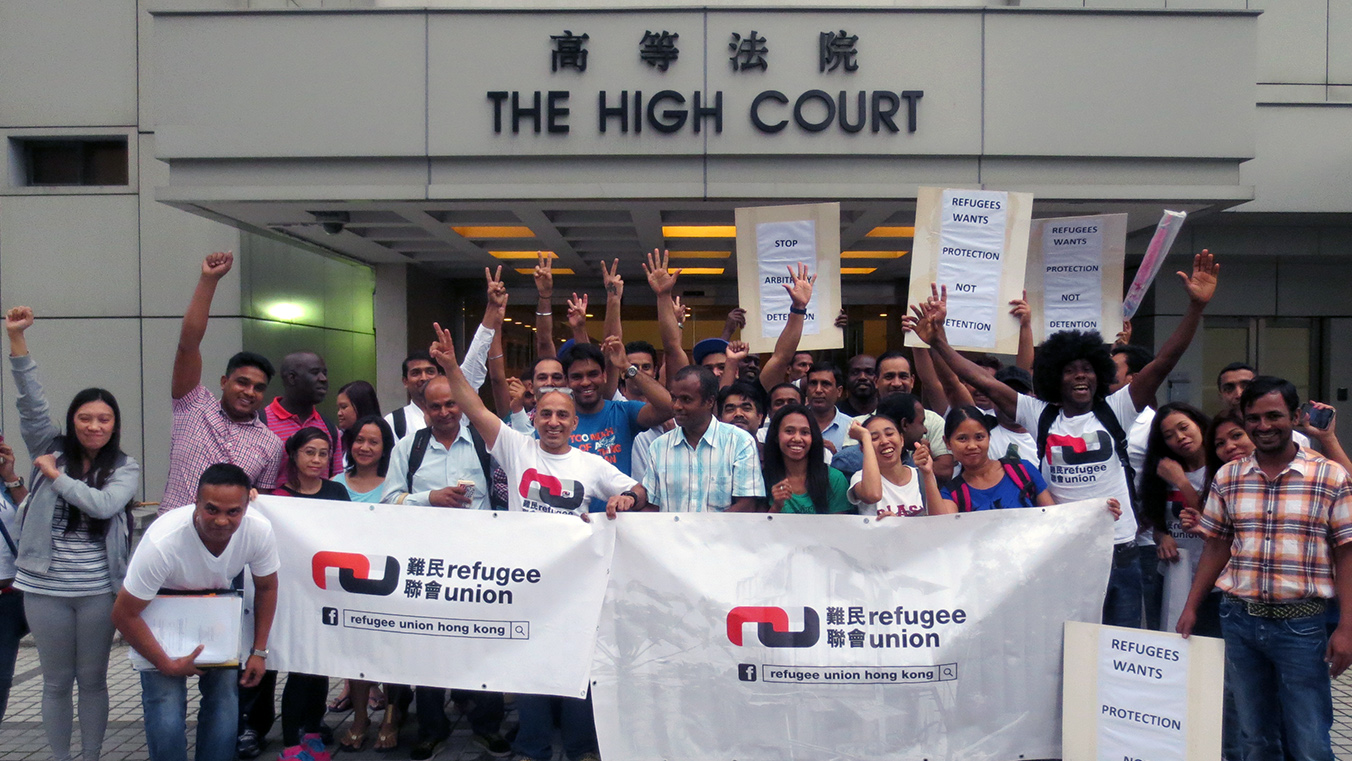
Legal visit exposes apparent abuse in Immigration detention centre
May 20th, 2015 | Detention, Government, Immigration, Legal, Rejection, VF Opinion | Comment
Vision First fearlessly reports on incidents that place under the spotlight practices adopted by various Government bodies which include the Director of Immigration, Security Bureau, Social Welfare Department and Hospital Authority.
Examples are asylum policies resulting in an effective zero percent acceptance rate, welfare failures, institutional discrimination and abuses of power by those in authority. It is unfortunate that enormous and entrenched distrust continues to widen between refugees and Government authorities, with officials often failing in their duties prescribed by law.
Government propaganda and uninformed media reports often depict refugees as abusers of the asylum process accusing them of exploiting the system for personal gain. Such generalisation is simply untrue for asylum seekers who fled torture, ill-treatment, death threats and persecution to seek protection from Hong Kong’s Government.
It is increasingly clear that the secretive walls of the Director of Immigration’s Castle Peak Bay Immigration Centre (CIC) conceal apparent unlawful conduct. On 6 May 2015, Vision First arranged a visit to CIC to provide free legal advice to refugees in relation to asylum claims, the legality of such procedures, conditions and legality of detention and to secure their release from arbitrary deprivation of their liberty
The pro bono legal team comprising Barristers Mark Sutherland and Robert Tibbo, together with their instructing solicitors and interpreters, paid a visit to CIC. This is what transpired. One refugee from Africa had reportedly been detained in CIC for over three and a half months whilst the assessment of his “first tier” non-refoulement claims was underway with all the interviews so far being conducted within CIC. His next interview was due to take place the following day, 7 May 2015.
Another refugee from Africa had been reportedly detained for over a month and only that morning had been handed a set of blank Supplementary Claim Forms by The Duty Lawyer Service (DLS). This was presumably prompted by the prior lodgement of a non-refoulement claim. The assessment of this refugee’s claim had not even started and a lawyer not yet assigned to him by DLS.
A further refugee from South Asia reported that he had attempted to argue his own Appeal without a lawyer and had experienced a detention period of seven months.
Troubled by his findings of lengthy periods of detention, Barrister Mark Sutherland asked to see the supervising Immigration officer. During the course of an hour, three Immigration officers of differing levels of seniority appeared but could not shed any light on the seemingly unlawful detention of the refugees.
Finally, the Superintendent of CIC, a Mr. W.S. Kwong, the highest ranking Immigration officer responsible for CIC attended and agreed to a meeting with the pro bono legal team during which serious concerns were expressed as to the legality of the detention of the refugees. Sutherland asked Mr. Kwong: “Are you aware of the Ghulam Rbani case?” Mr. Kwong replied words to the following effect: “I have never heard of it. It’s not my department.”
Superintendent Kwong was unaware of this landmark and legally binding decision of the Court of Final Appeal case “Ghulam Rbani vs. Secretary for Justice” (FACV 15/2013), wherein it states:-
“Once it became clear that the CAT claim had to run its course, it would have been obvious that no decision to make a removal order could have been arrived at within the maximum period of detention permitted under section 32. Applying the 3rd Hardial Singh principle, steps should then have been taken without delay to effect the appellant’s release.”
Put simply, if an asylum seeker has filed a claim for non-refoulement protection, he cannot lawfully be detained and must be released forthwith.
Vision First is of the view that the Director of Immigration, Mr. K.K. Chan, should call for an immediate review of the detention status of each and every inmate currently held at CIC. Sutherland invited Superintendent Kwong to see that such a review was undertaken as a matter of priority. The result is awaited.
Based on this legal visit, Vision First is satisfied that there is sufficient evidence to merit an independent investigation of the apparent disregard by the Hong Kong Government of the principles enunciated by the Court of Final Appeal in Ghulam Rbani. We shall leave it to our readers to draw their own conclusions.
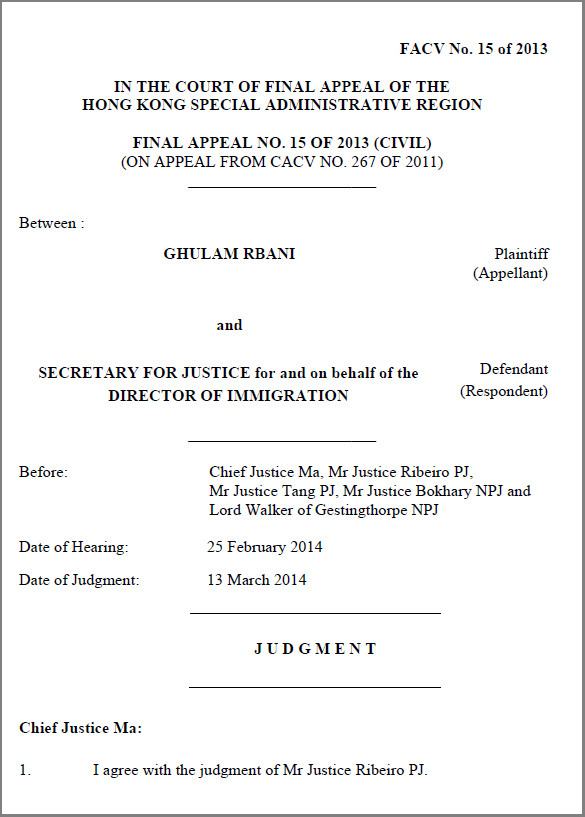
Misleading cartoon stokes unnecessary fears
May 18th, 2015 | Media, Rejection, VF Opinion | Comment
The South China Morning Post published this cartoon in its print edition on Saturday, 16 May 2015. The depiction of a refugee tsunami does little to further the understanding of why persecuted minorities abandon their homeland and why neighbouring countries tow their boats back out to sea – rather than offering humanitarian assistance.
In an attempt to counter prevailing myths, we offers a brief extract from “Asylum Seeking and the Global City” (p. 160) written by Mr. Francesco Vecchio, non-executive director of Vision First.
“While the majority of asylum seekers are demonized as abusive illegal migrants and penalized for working illegally, those few who abide by the rules are perceived and helped as the genuine refugees, in turn furthering the legal exclusion of the former.
The lack of agency and constant need of care among the so-called genuine refugees, however, raises public fears about the impact on Hong Kong were the floodgates to be opened, specifically on the official policy of minimal spending on welfare.
Therefore whether they are depicted as a burden or as abusive, deviant characters, asylum seeker typify a new form of socio-legal stratification, at the bottom of which they function as the key means of inducing redistributive benefits and labour flexibility, while at the same time embodying an easy target for public resentment.
A self-fulfilling cycle is thus fashioned, arguably assisting the government to administer and articulate social order through immigration control.”
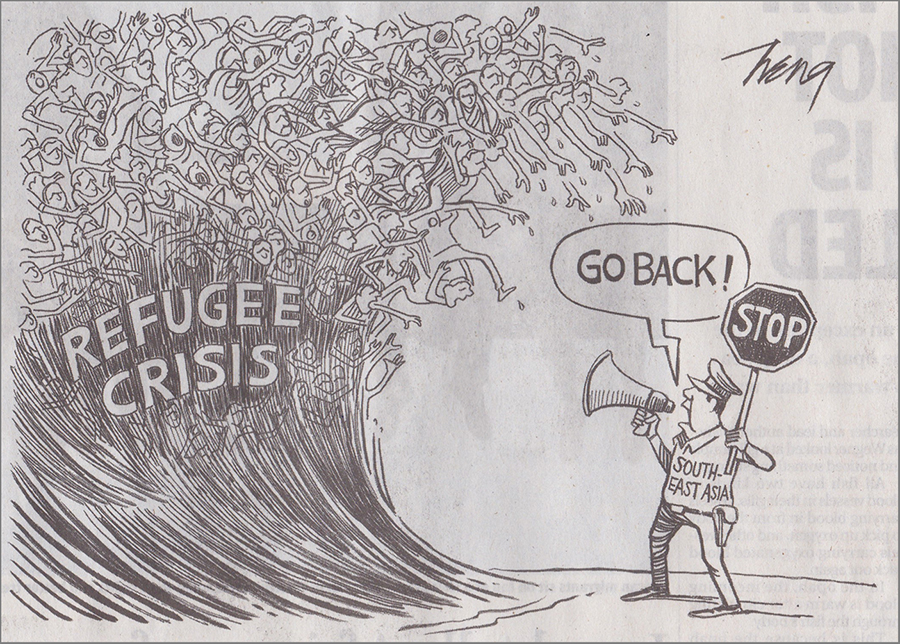
Why is Hong Kong hostile to refugees?
May 6th, 2015 | Detention, Immigration, Legal, Rejection, VF Opinion | Comment
It was hard to answer the question of a visitor to Vision First who sought to understand the caustic environment navigated by refugees with a slim chance of securing protection in an indifferent city. Ironically, Hong Kong has long had a history of welcoming refugees (1.5 million between the 1930s and 1970s), but its sympathy and support of persecuted foreigners dwindled regrettably as residents became richer.
The government mantra is well rehearsed, “Non-refoulement claims lodged under the USM are not asylum claims. The Refugee Convention and its 1967 Protocol have never applied to Hong Kong. The Government maintains a firm policy of not granting asylum to or determining the refugee status of anyone. Our policy objective is to screen … and to remove rejected claimants from Hong Kong as soon as possible. Lodging a claim does not change the fact that non-refoulement claimants are illegal immigrants or overstayers.”
The results of such a policy appear skewed towards removal. Between 2009 and 2014, Immigration screened 5581 claims and substantiated just 25. It is noteworthy that in 6 years Immigration failed to grant protection to a single asylum seeker among 2166 Pakistani, 1760 Indians and 1237 Bangladeshi. Hong Kong has never protected a claimant from these countries. By contrast, in 2013 Australian protection grants produced very different results: Pakistani 80.4%, Indians 6.3% and Bangladeshi 42.7% at first instance (p. 20). Astonishing it is that Pakistani scored 94.9% including appeals (p. 30). How does it compare to Hong Kong’s achievements?
Despite profuse assurances to the contrary, it appears that Hong Kong Government has abdicated its obligation to protect refugees and has instead prioritized rejection and removal. An elaborate performance by 480 lawyers ‘who have received specialised training’ has done little to improve the effective zero percent acceptance rate. To the contrary, the authorities are focused on cost-cutting to reduce the $644 million spent on claimants, including legal aid up 86% last year.
Stringent immigration control and deterrent welfare were ingeniously deployed to deter asylum seekers from remaining in Hong Kong, but their number doubled in 2014 to 9618, reflecting worrying global trends. Immigration is presumably feeling the pressure and this year plans to determine 2000 claims, which might fail to reduce the total ‘with new claims coming in at more than 300 per month since early 2014.’
In an obfuscated environment of rejection and expediency, is it possible that some refugees might be removed or deported to their country of origin at a risk of life and limb? It is hard to make factual assessments, as the Castle Peak Bay Immigration Centre (CIC) remains off-limits to rights advocates and detainees may only be visited by appointed lawyers. Refugees denied release on recognizance are unlikely to enjoy adequate legal advice, or second opinions on their claims.
In this potential black hole, can Immigration be trusted to adhere scrupulously to high standards of fairness, respect fundamental refugee rights and assess claims in a non-adversarial manner as required by law? Acting on a pro bono basis, barristers Robert Tibbo and Mark Sutherland, non-executive directors of Vision First, visited CIC on 6 May 2015 to take instructions from 24 detainees who sought the assistance of the Refugee Union against imminent removal orders. It was reported that 5 had already ‘left from Hong Kong International airport’ with no further details.
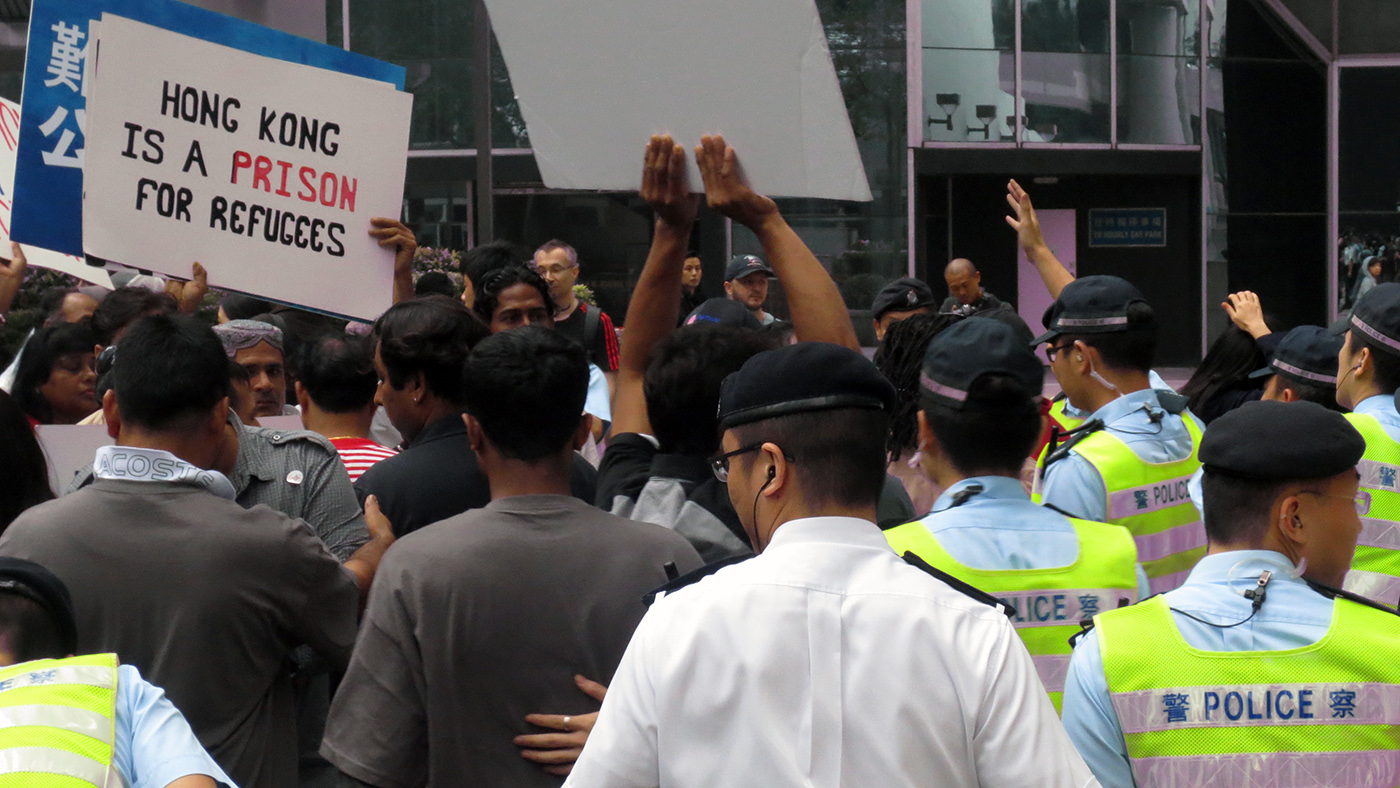
A legal and moral obligation to increase welfare to realistic levels
Apr 23rd, 2015 | Housing, Immigration, VF Opinion, Welfare | Comment
Refugees in Hong Kong worry most about two issues: protection and welfare. Over the years the Immigration Department has done little to allay suspicions that the effective zero-percent acceptance rate is a poor assessment of the asylum community. Welfare issues are equally troubling with policies that deliberately entrap refugees below the poverty line without employment rights.
On a scale of importance, Vision First is primarily concerned about the failure of the Unified Screening Mechanism to generate protection. In the interest of accountability and transparency, Immigration ought to publish monthly results to inform interested parties about its accomplishments in the asylum sphere. This would undoubtedly better inform opinions.
After Hong Kong’s top court denied the right to work in February 2014 to mandated refugees and successful torture claimants, it became disappointingly clear that the authorities are years away from granting employment rights to asylum seekers condemned, by policy and design, to a protracted state of emotional and economic destitution with deterrence aims.
A combination of questionable policies force refugees to run the gauntlet between insufficient welfare and imprisonment for working illegally. Such arrangements strike offenders heavily with arrests and imprisonment that are hardly avoidable when money must be regularly raised to meet necessary expenses, such as rent surpluses, utilities, food and clothing.
Instigated by superficial media reporting, common perception assumes that refugees should receive less welfare than impoverished residents. This is shamefully reflected in the welfare disparity between citizens and refugees, despite the former being allowed to work and the latter jailed up to 22 months for breaking the law in a hostile, and arguably unjust environment.
On 22 April 2015, Vision First and the Refugee Union met with the Hon. Fernando Cheung Chiu-hung to strategize on increasing welfare levels that are unrealistically low (HK$ 1500 for rent and HK$ 1200 for food) and have fallen behind inflection, particularly in the rental market. A first batch of 300 complaint forms were submitted to the Legislative Council’s Redress System to trigger a discussion by the Panel on Welfare that advises the government on such matters.
Questions will be raised about the adequacy of the current assistance which fail to meet the basic needs of a growing refugee population. Deterrence objectives and criminalization of vulnerable foreigners should not overshadow welfare considerations when men, women and children are suffering in our community. As long as work rights are denied, the authorities have a legal and moral obligation to increase welfare to realistic levels consistent with human right laws.
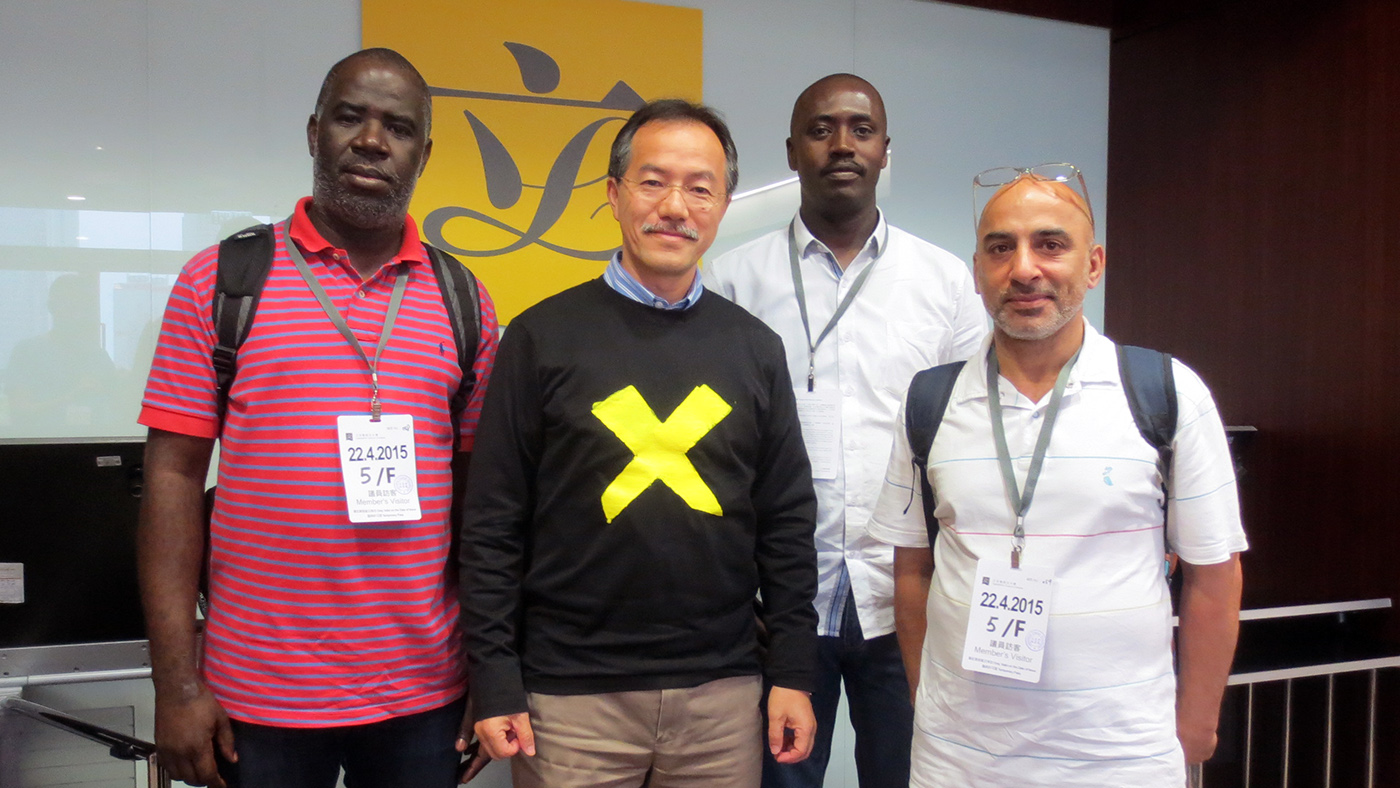
The cardboard box community of Sham Shui Po
Apr 21st, 2015 | Advocacy, Housing, VF Opinion, Welfare | Comment
A fire broke out on a remarkable foot bridge over four-lane Yen Chow Street West in Sham Shui Po on the night of 19 April 2015. This pedestrian crossings was home to over a dozen homeless persons who lived in semi-permanent huts made of plywood, cardboard and plastic sheets. Some had lived there for years.
News of the fire spread quickly among refugees who three times a month join a local charity, which prefers to remain anonymous, to distribute food to this homeless community comprising mostly elderly and troubled residents. This humanitarian service has brought refugees closer to impoverished residents who suffer similar neglect and deprivation in our affluent city.
While firefighters doused the flames, several concern groups rushed to offer assistance and speak about the shameful conditions endured by several hundred vulnerable persons in the neighbourhood. A Refugee Union member later observed, “NGO people should coordinate efforts to advocate for badly needed changes … better welfare and proper homes is what these people need … Isn’t the government ashamed how people suffer in the streets?”
After the fire, a passive-reactive government did what it does best – lock the stable doors after the horse has bolted. Drawing parallels with the fires that brought death and destruction to refugee slums, the Fire Service Department clamped down on the homeless people living on that food bridge with little concern where they would end up sleeping – possibly under a different flyover.
An NGO worker familiar with the area reported that there are over 60 Vietnamese refugees living in cardboard huts under that section of the West Kowloon Corridor. A long row of huts adjacent to the Tung Chau Street Park offers a sheltered space for sleeping and storage. These shacks are apparently tolerated by the authorities on the hidden side of the wet market where they are less likely to offend the public conscience.
It is understood that the refugees living there collect groceries at the ISS-HK appointed shops and cook with gas stoves on the pavement. There is no electricity for refrigerators. These refugees are unable to rent rooms for the 1500$ allowance and lack the organizational skills to request better assistance. They might strengthen statistics presented to the Social Welfare Department that encompass refugees who collect food rations, but seemingly do not require rent assistance.
Vision First will partner with Refugee Union to plan a Vietnamese language drive to reach out to this most marginalized and uninformed sub-group said to comprise veterans who have been in Hong Kong for twenty years as well as newcomers who arrived within the last year.
The plight of the homeless ought to be a concern for all citizens privileged to sleep under a proper roof. The human suffering caused by ineffective policies ought to resonate with everyone as we wonder why government and community are failing the most vulnerable in society, citizens and foreigners alike.
“Tonight we will gather to serve the homeless again,” remarked a refugee mother, “There are people suffering worse than us and this (community service) opened my eyes. I cannot work, but I can help other needy people. This is very meaningful for me. At the end of the day we are the suffering people … It doesn’t matter the colour of our skin or where we come from.”


